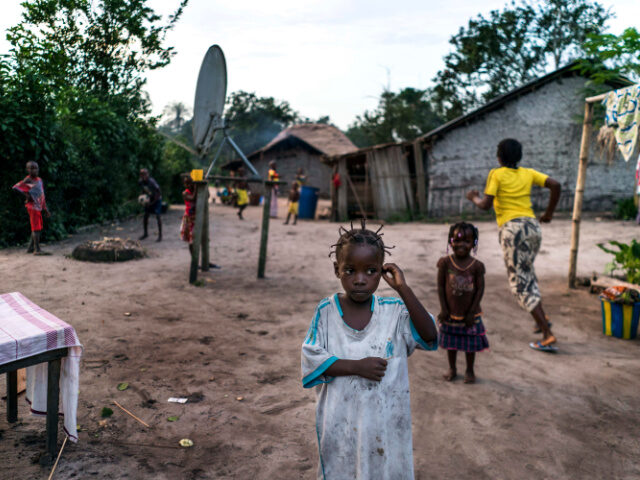Researchers in the Democratic Republic of Congo (DRC) warned on Tuesday that a new and deadly strain of monkeypox, or “mpox,” is spreading among “sex workers” in the conflict-prone eastern part of the country.
The new Clade-1b strain appears to be considerably more dangerous than the monkeypox strain that caused a brief international panic in the spring and summer of 2022.
Prior to 2022, monkeypox was a relatively obscure disease that spread mostly in parts of western and central Africa where humans had frequent contact with monkeys and infected rodents. Infections were rarely fatal, but they tended to be quite unpleasant, marked by painful skin lesions. Monkeypox is a zoonotic disease, meaning it is primarily spread from animals to humans.
In the spring of 2022, unprecedented outbreaks of monkeypox were detected in Europe and the United States, creating panic among some public health officials and the media. The total number of cases in these outbreaks was relatively small but still far higher than had been seen outside of Africa before, and people were naturally nervous about the “next pandemic” after the Wuhan coronavirus pandemic.
The World Health Organization (W.H.O.) declared an international public health emergency over monkeypox in July 2022, citing cases in more than 70 countries. President Joe Biden said in May 2022 that “everybody should be concerned about” monkeypox. The Biden administration declared a nationwide monkeypox health emergency in August 2022.
Monkeypox quickly became politicized. W.H.O. insisted the disease was now spreading freely between humans, so monkeys should not be stigmatized for causing the outbreaks. In November 2022, W.H.O. renamed monkeypox to “mpox” because the old name was supposedly “racist and stigmatizing.”
W.H.O. stopped distinguishing between “endemic” countries (the African countries where the disease was traditionally found) and “non-endemic” nations because it feared people in non-endemic countries were not taking the outbreak seriously enough.
The monkeypox panic sputtered out in the fall of 2022 because the number of cases in the “outbreaks” was never large, and the public was never as worried about the disease as government officials. The U.S. Centers for Disease Control (CDC) counted 97,281 confirmed cases in the 2022 outbreak worldwide, with only 184 confirmed fatalities.
Monkeypox became politically awkward because a few months into the global public health emergency, researchers began admitting that almost all of the transmission was occurring between homosexual men. The disease mostly spreads through contact with infected skin, and gay men were the only group making such contact in substantial numbers.
W.H.O. director Tedros Adhanom Ghebreyesus urged gay and bisexual men to limit their number of sex partners in July 2022 to slow the spread of the disease. This advice seems to have been taken by the gay community, putting a fairly swift end to the outbreak. W.H.O. formally ended its monkeypox emergency in May 2023.
DRC researchers on Tuesday said they have detected about a thousand cases of the new Clade-1b strain since September in the Congo’s South Kivu province, near the Rwandan border, largely among sex workers and people with whom they had close contact. At least three fatalities in South Africa may have been caused by the strain, although those cases have not been confirmed yet.
Data is limited because observations have thus far been limited to patients who sought hospital care, while those with more mild infections might have decided not to seek treatment, but Clade-1b appears to be more fatal than the 2022 version of the disease. It is a mutation of a strain called Clade-1, which was always known to be more severe but was primarily spread among people who ate infected meat, so it did not spread widely.
The mortality rate thus far has been five percent among adults and ten percent among children, compared to about 0.5 percent among adults from the older strain. Rashes from the new strain are more severe and spread across more of the victim’s body, and they are more likely to have lasting effects on the patient. One infected healthcare workers reportedly lost her eyesight.
Most disturbingly, Clade-1b appears to spread more easily than earlier versions of mpox, with outbreaks reported among households, healthcare workers, and a group of schoolchildren. There have also been reports of pregnant women spreading the disease to their babies or suffering miscarriages.
Some researchers fear Clade-1b can spread while the patients are asymptomatic, without any visible rashes or lesions at all. These attributes make it more likely that the disease could spread across national borders, borne by air and ground travelers.
The good news is that existing monkeypox vaccines have been effective at treating the new strain. W.H.O. is planning a major vaccination campaign in South Kivu as soon as the local rainy season subsides, making remote areas more accessible. Some researchers worry that the end of the rainy season could also make the outbreak spread faster, as people who live in South Kivu will become more mobile.
“It’s undoubtedly the most dangerous of all the known strains of mpox, considering how it is transmitted, how it is spread, and also the symptoms,” University of Rwanda researcher Jean Claude Udahemuka said.
“Everyone should get prepared. Everyone should be able to detect the disease as early as possible. But more important, everyone should support the local research and local response so that it doesn’t spread,” he urged.
“It’s definitely the most dangerous strain yet. We don’t know how many non-severe cases are hidden,” agreed global health research professor Trudie Lang of the University of Oxford.
Lang said the situation in the Congo is “incredibly severe” because the country’s supply of vaccines and other medicines is dangerously low.
Udahemuka said the first known case of the new strain involved a man who had sex with several different women in the outbreak area. The South Kivu Health Department said it would concentrate early vaccination efforts on sex workers and healthcare workers.



COMMENTS
Please let us know if you're having issues with commenting.